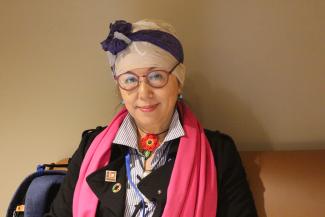
Baitz Niahosa (Tsou), Taiwan
I’m from the mountain villages in Taiwan. We only have 4,000 Tsou people left. Not even a thousand people still speak the Tsou language. We are working very hard for traditional knowledge protection and we try to get our youth and our children to know about our traditional knowledge. We try to revive our knowledge from other peoples, and we would like to protect our traditional knowledge from exploitation by academic researchers and other groups. We are advocating for a law to get researchers and other interested groups for our traditional knowledge and languages to sign a contract with us before they put anything out. Any of the traditional knowledge they write about or record has to have our prior and informed consent before they put it out.
We have classes to transmit knowledge to younger generations. I set up classes in our nation and I have a singing group where we sing our songs in our traditional way and in our languages. The kids love to sing, they learn language from singing. We use elder people too as mentors for these kids. They have the responsibility to do that, and they like the work. The education system in our country does not include elders, because they think elders do not know how to teach. Our tradition is oral, we don’t have schools; we don’t have a system. We just teach our kids. The method is there. Because we’ve been prohibited to speak our language for hundreds and hundreds of years, we are only now reviving our language. We are in the healing process to heal all these traumas. I got punished every time I spoke my language. When you speak your language, you still sometimes have a block in your mind, you still have fear sometimes.
Maintaining our tradition, ceremony is the biggest concern we have now because our elders are passing on to the other world. We are trying to gather these elders to interview them about as much as they can remember. We gather lots of elders because when they get together, they remember lots of things. They keep talking and we get people to write it down because now we are establishing a writing system for ourselves. The elders are excited to pass on their life knowledge, their handicrafts, and their vision of the world that was from their parents or grandparents. If we don’t get things from our ancestors, this culture will not continue, our identity will be lost, and our main thoughts will be different. We are trying to get our identity and our Tribal-centered thought back. Our ancestors are our roots. It’s like a tree; if you don’t have roots, you can’t have a fruit, you can’t have anything that grows. Language is the main thing for our Indigenous existence. If there is no language, we will not be here. Our language has our culture in it. The songs have all sorts of knowledge of life. As soon as you speak the language, your distance is very close, you become one family. All over the world we are facing the same problems: language loss and the invasion of our traditional knowledge. We should wake up and ask questions: Why do we give them these things? Why don’t we keep our things? I think we have to keep our knowledge in our place, keep our people in our nation, keep our everything among us. Otherwise, our culture will become theirs in a book or a museum.
